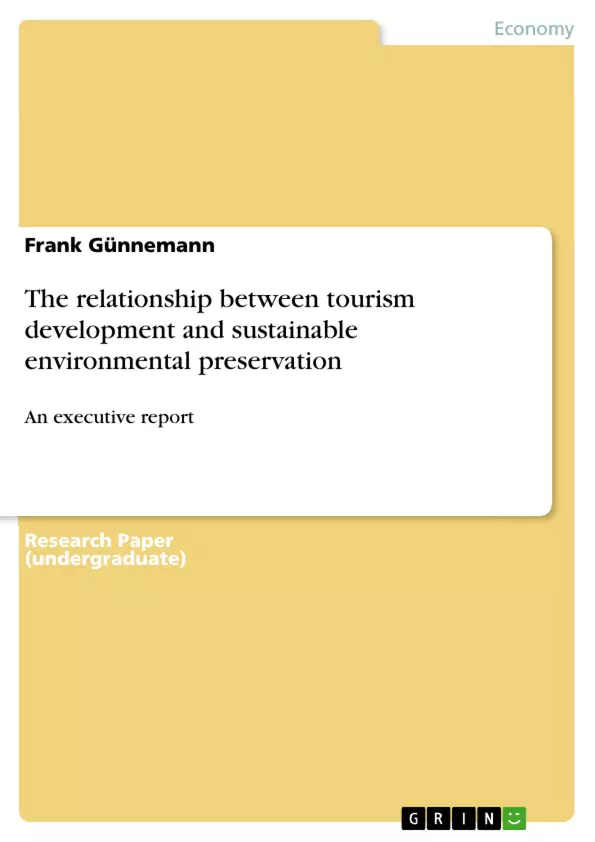As the global tourism industry grows at an ever-faster pace, traditional vacation destinations become less important and oversaturated; more and more people are looking for exotic, unique and unspoiled destinations, offering pristine nature and a culturally rich experience. At the same time, however, this mass tourism is threatening exactly that through severe, negative impacts it has on the host community. The following research will concentrate on sustainable tourism development and environmental preservation. First, the issue on hand will be identified through pointing out the need, stating both the problem and the benefits, and giving a methodology. The next step then is the literature review, which will concentrate on conceptual/theoretical and research studies literature to gain a deeper understanding of the issue, and ultimately on cases literature to point out the importance of the issue. The next step is a deeper analysis of the insights the literature delivered by highlighting approaches/options and implementations for the client. Also, a conclusion and recommendation will be provided, which draw on the findings, as well as a bibliography.
Inhaltsverzeichnis (Table of Contents)
- Identification of the Issue
- The Need
- Statement of the Problem
- Benefits of the Research
- Methodology
- Literature Review
- Conceptual and Theoretical Literature Related to the Issue
- Research Studies Literature Related to the Issue
- Cases Literature Related to the Issue
- Summary of Literature Review
Zielsetzung und Themenschwerpunkte (Objectives and Key Themes)
This executive report investigates the relationship between tourism development and sustainable environmental preservation. It aims to explore the challenges posed by mass tourism to unique and unspoiled destinations, while highlighting the benefits and importance of sustainable tourism development. The research focuses on the need for environmental preservation and its connection to the growth of the tourism industry, emphasizing the need for responsible practices to protect both cultural and natural heritage.
- The growth of the tourism industry and its impact on traditional and unique destinations.
- The importance of sustainable tourism development for preserving the environment and local cultures.
- The role of local communities in shaping and managing tourism activities.
- The potential benefits and challenges of the bottom-up approach to tourism development.
- Examples of successful sustainable tourism initiatives and their impact on local communities.
Zusammenfassung der Kapitel (Chapter Summaries)
The report begins by identifying the issue of tourism development and its relationship with sustainable environmental preservation. It argues that while tourism has the potential to benefit local communities economically, it can also have negative impacts on the environment and culture. The report then delves into the literature review, exploring conceptual and theoretical studies on sustainable tourism, as well as research findings and case studies.
The literature review highlights the interconnected aspects of sustainability – environmental, socio-cultural, and economic. It emphasizes the importance of local participation and community ownership in shaping tourism activities. The report focuses on the bottom-up approach to tourism development, which empowers local communities to manage and control tourism activities, preserving their cultural and environmental uniqueness. It presents the case of Prainha do Canto Verde, a Brazilian fishing village that successfully implemented a bottom-up approach to sustainable tourism, highlighting its benefits and challenges.
The report concludes with a summary of the literature review, highlighting the need for sustainable tourism development and the importance of local communities in shaping the future of tourism. It emphasizes the importance of prioritizing the needs and interests of local communities while ensuring the sustainability of tourism activities.
Schlüsselwörter (Keywords)
The key concepts and themes explored in this report include sustainable tourism, environmental preservation, tourism development, community ownership, bottom-up approach, cultural tourism, and local participation.
Frequently Asked Questions
What is the relationship between tourism and environmental preservation?
The research explores how growing global tourism can threaten unspoiled destinations while also providing economic incentives for sustainable environmental and cultural preservation.
What are the negative impacts of mass tourism?
Mass tourism can lead to the over-saturation of destinations, degradation of pristine nature, and negative socio-cultural impacts on host communities.
What is the "bottom-up" approach to tourism development?
It is an approach that empowers local communities to manage and control tourism activities themselves, ensuring that their needs and environmental uniqueness are prioritized.
Can you give an example of a successful sustainable tourism project?
The report highlights Prainha do Canto Verde, a Brazilian fishing village that successfully implemented community-owned tourism to protect its local culture and environment.
What are the three interconnected aspects of sustainability?
Sustainability in tourism involves balancing environmental, socio-cultural, and economic interests.
- Citation du texte
- Frank Günnemann (Auteur), 2006, The relationship between tourism development and sustainable environmental preservation, Munich, GRIN Verlag, https://www.grin.com/document/114710



